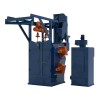The Thirteen Commandments: No. 2
"Design A System To Reflect Your Corporate Culture"
There is no single, correct way to design, implement, and update an ICP. However, here are some issues to consider:
A. Decide On How Much You Want To Centralize Your Export and import Tasks
A good ICP consolidates information and company policies so that it becomes a dependable guide for everyone with exporting or importing responsibilities. However, whether functions, tasks, and responsibilities should also be centralized depends on the corporation.
There are some things to consider: Be careful about mingling corporate functions that may compromise compliance objectives (for example, mixing sales with export/import responsibilities). Be careful about assigning all or most compliance responsibilities to a person who is not sufficiently high in the corporate hierarchy to take remedial actions. Have backups in place in case an office or a key compliance person leaves or disappears.
Your company may wish to decentralize some of its exporting or importing functions. Decentralization is not the same as forgoing corporate oversight of compliance efforts. Decentralization merely means that some functions or employees related to exporting or importing are dispersed in your company. The aim always remains the same: create a unified vision of a what your ICP does and a unified method of accomplishing that goal.
B. Decide whether To Separate Your Export/import ICP From Other Corporate Compliance Systems
Depending on the size of your company, you probably already have compliance and recordkeeping programs that cover other legal issues (environmental, employment, tax, etc.). Most companies will find it easier to comply with the law by segregating their exporting/importing ICP from these existing programs.
If your company both imports and exports, a more difficult question is whether to consolidate exporting and importing into one ICP. Although different government agencies sometimes share responsibilities for enforcing both export and import laws (for example, the Bureau of Export Administration and the US Customs Service both enforce export laws), there are still considerable differences between the requirements imposed on exporters and importers. It may be wise to set up separate ICPs, but still make it possible for key traffic and logistics personnel to periodically exchange information.
C. Get Electronic
If you're not automating your exporting or importing functions and records, you are way behind the competitive edge. You will be treated like a pariah by customers and the Government. You will not be able to take advantage of emerging technologies (like the internet, intranets, and EDI) or government initiatives like remote filing of export and import documents. There is no reason not to automate. Software and digital communication technologies will reduce transaction costs. Automation decreases your reliance on middle-men and consultants for preparing, keeping, and filing of export and import documents.






